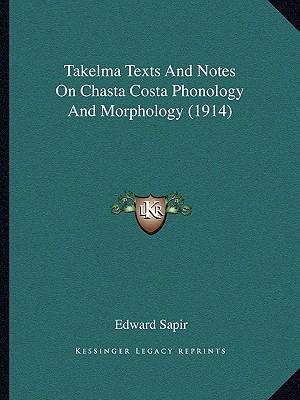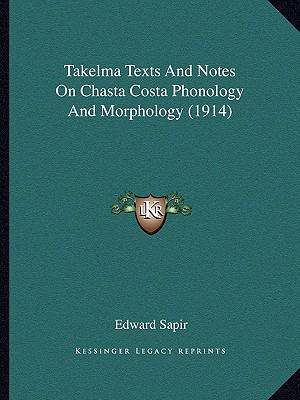
- Afhalen na 1 uur in een winkel met voorraad
- Gratis thuislevering in België vanaf € 30
- Ruim aanbod met 7 miljoen producten
- Afhalen na 1 uur in een winkel met voorraad
- Gratis thuislevering in België vanaf € 30
- Ruim aanbod met 7 miljoen producten
Zoeken
Takelma Texts And Notes On Chasta Costa Phonology And Morphology (1914)
Edward Sapir
Paperback | Engels
€ 46,45
+ 92 punten
Uitvoering
Omschrijving
""Takelma Texts And Notes On Chasta Costa Phonology And Morphology"" is a book written by Edward Sapir in 1914. The book is a collection of texts and notes on the Takelma language, a Native American language spoken in the Pacific Northwest region of the United States. The book also includes information on the Chasta Costa dialect, which is a dialect of the Takelma language. The book is divided into two parts, with the first part containing the texts and the second part containing the notes on the phonology and morphology of the language. The texts in the book were collected by Sapir during his fieldwork in the region, and they provide insight into the culture and history of the Takelma people. The notes on the phonology and morphology of the language provide a detailed analysis of the sound system and grammar of the language, making this book an important resource for linguists and researchers interested in Native American languages. Overall, ""Takelma Texts And Notes On Chasta Costa Phonology And Morphology"" is a valuable contribution to the study of the Takelma language and the culture of the Takelma people.This scarce antiquarian book is a facsimile reprint of the old original and may contain some imperfections such as library marks and notations. Because we believe this work is culturally important, we have made it available as part of our commitment for protecting, preserving, and promoting the world's literature in affordable, high quality, modern editions, that are true to their original work.
Specificaties
Betrokkenen
- Auteur(s):
- Uitgeverij:
Inhoud
- Aantal bladzijden:
- 342
- Taal:
- Engels
Eigenschappen
- Productcode (EAN):
- 9781165799213
- Verschijningsdatum:
- 10/09/2010
- Uitvoering:
- Paperback
- Formaat:
- Trade paperback (VS)
- Afmetingen:
- 210 mm x 279 mm
- Gewicht:
- 771 g

Alleen bij Standaard Boekhandel
+ 92 punten op je klantenkaart van Standaard Boekhandel
Beoordelingen
We publiceren alleen reviews die voldoen aan de voorwaarden voor reviews. Bekijk onze voorwaarden voor reviews.








